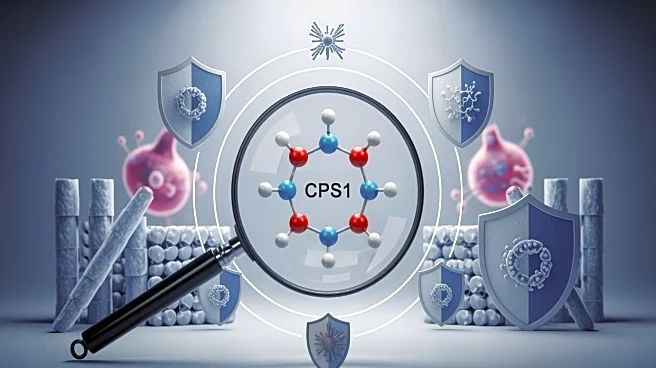What's Happening?
Recent research has uncovered CPS1 as a potential therapeutic target for breast cancer immune evasion. The study utilized single-cell multi-omics to analyze breast cancer samples, revealing that CPS1 plays
a significant role in immune escape mechanisms. The research focused on the MIF-CXCR4 signaling pathway, which is known to promote tumor proliferation and survival while downregulating anti-tumor immune surveillance. This pathway maintains the exhausted state of CD8 T cells, reducing the efficacy of immunotherapy. The study involved extensive data processing from various datasets, including TCGA-BRCA and GEO, and employed machine learning algorithms to identify mitochondrial-related biomarkers that could predict breast cancer prognosis. The findings suggest that targeting CPS1 could enhance the effectiveness of immunotherapy in breast cancer patients.
Why It's Important?
The identification of CPS1 as a therapeutic target is significant for the development of more effective treatments for breast cancer. By addressing the immune evasion mechanisms, therapies can potentially improve patient outcomes and survival rates. This research highlights the importance of understanding the molecular pathways involved in cancer progression and immune escape, which could lead to personalized treatment strategies. The study's use of multi-cohort survival analysis and machine learning models underscores the potential for integrating advanced technologies in cancer research, paving the way for innovative approaches to combat breast cancer.
What's Next?
Further research is needed to validate CPS1 as a therapeutic target and explore its potential in clinical settings. The study suggests that targeting the MIF-CXCR4 signaling pathway could improve immunotherapy responses, but clinical trials are necessary to confirm these findings. Researchers may focus on developing drugs that specifically inhibit CPS1, potentially leading to new treatment options for breast cancer patients. Additionally, the integration of single-cell multi-omics and machine learning in cancer research could be expanded to other types of cancer, offering broader applications for these technologies.
Beyond the Headlines
The study's approach to analyzing mitochondrial-related genes and their impact on cancer prognosis highlights the complex interplay between cellular metabolism and immune response. This research could lead to a deeper understanding of how cancer cells manipulate metabolic pathways to evade immune detection, offering insights into potential vulnerabilities that can be targeted therapeutically. The ethical implications of using advanced technologies like machine learning in medical research also warrant consideration, particularly in terms of data privacy and the accuracy of predictive models.









